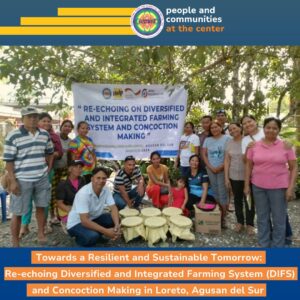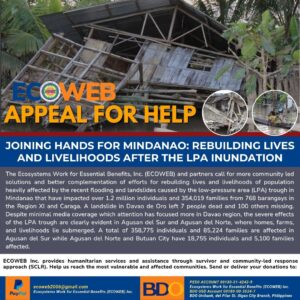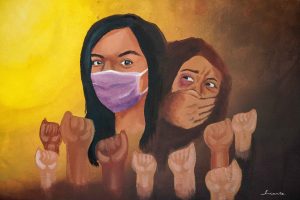The workshop aimed to equip 40 participants with the skills and tools needed to drive community-led responses using the Survivor and Community-Led Crisis Response (SCLR) approach.
In a pivotal step toward strengthening community resilience in Iligan City, ECOWEB recently facilitated a four-day “Co-Designing Workshop on Community-Led Crisis Response and Anticipatory Resilience Action.” Held at Frosty Bites in Iligan City, Lanao del Norte, the workshop brought together 40 dedicated participants to build capacity for piloting the Survivor and Community-Led Crisis Response (SCLR) approach. These participants, comprising members of the Project Management Team (PMT), Project Implementing Team (PIT), and local partners, will play a key role in leaading this transformative partnership between ECOWEB, the Iligan City Local Government Unit (LGU), and CLEARNet member, BDev Child Protection. The workshop was co-facilitated by ECOWEB Executive Director Regina “Nanette” Salvador-Antequisa, Program Coordinator Imelda Manginsay, CLEARNet Coordinator Tasnim Racman, and Iligan City Social Development and Environmental Management Division Head Renefe Mosot-Padilla.
The SCLR approach, a focal point of the training, empowers disaster-affected and vulnerable communities to lead their own response, recovery, and resilience efforts. By providing micro-grants to community groups, the SCLR model shifts the power of response to the people themselves, who are often best positioned to understand their needs and devise effective solutions. Participants, including representatives from key Iligan City offices, learned to implement SCLR tools and methodologies, integrating participatory community resilience planning with the Listen, Discover, Enhance (LDE) methodologies introduced through the ERC initiative in the Philippines.
A Shared Vision for Resilient Communities
The workshop sessions were designed to appreciate the sclr principles and the tools, while ensuring interactive and reflective discussions throughout the 4-day session foster skill-building and reflection on crisis response practices.
The pilot SCLR initiative in Iligan City, backed by a ₱4 million co-funding from the Iligan City LGU and ECOWEB with support from the Legatum Limited Foundation and Vitol Foundation, exemplifies the collective vision for self-sustaining resilience. This collaboration affirms ECOWEB’s commitment to center community voices and agency in humanitarian and resilience-building efforts, alongside the vital role of government support in ensuring sustainability.
The initiative was officially launched with the signing of a Memorandum of Agreement on September 4, 2024, at the Iligan City Sanggunian Hall. Mayor Frederick Siao represented the LGU of Iligan, joined by ECOWEB Executive Director Regina S. Antequisa and BDev Child Protection’s representative. This landmark agreement marked the beginning of a strong partnership aimed at enhancing Iligan City’s preparedness and resilience in the face of crisis.
“The importance of the SCLR approach is that it empowers vulnerable communities to have their own response, recovery, and resilience efforts,” stated Iligan City Mayor Frederick Siao.
Reflecting on the workshop’s importance, Mayor Frederick Siao emphasized, “This is more than just a workshop; it’s a commitment to strengthening our community. With flooding and other crises common in Iligan, the SCLR approach empowers vulnerable communities to lead their own response, recovery, and resilience efforts. The ₱4 million funding ( ₱2 million from the city and ₱2 million from ECOWEB) is a meaningful investment in our city’s future resilience. I urge all participants to bring these learnings back to their offices and communities, empowering the people of Iligan to take action. Salamat sa inyong dedication. This is your shared journey towards a self-sustaining Iligan.”
Learning and Unlearning: An Empowering Workshop Journey

Sharleen May Namoc of the City Mayor’s Office – Gender and Development Office (CMO-GAD), shares the idea of their group on how to mitigate possible risks that might occur in the course of facilitating the sclr appoach, e.g. possible mismanagement of microgrant by a recipient community group.
Throughout the workshop, participants engaged deeply with the principles and practices of SCLR, learning to move beyond traditional, top-down response models that often disempower communities. Sessions covered SCLR’s “5 Ds” of Appreciative Inquiry, micro-grant management, and tools for anticipatory action, with practical exercises allowing participants to apply their skills in real-world scenarios. A key focus was on “unlearning” disempowering practices and “learning from failures,” encouraging participants to embrace strategies that prioritize community agency and localized decision-making.
During the reflection session, Ms. Jamalia Gandamra, a participant from the City Mayor’s Office-Gender and Development emphasized the importance of community engagement, noting, “I really appreciate this process. It allows us to dig deep and determine the community’s real issues and needs, which is essential for meaningful impact.” Similarly, Ms. Julita Bokingo from the City DRRM Office highlighted the community-driven nature of the SCLR approach: “Through this new thinking of the SCLR approach, we learn how we can better participate in the community’s initiatives. We don’t want to impose what we want on the community; it is community-driven. We need to ask them what they truly need.” These feedback demonstrate the emphasis made on the need to unlearn from the traditional practices in order for the sclr approach to really make a difference.
Field Experience in SCLR: Learning Through Community Engagement
One of the workshop’s highlights occurred on the third day when workshop participants applied their learning hands-on at the community level such as the facilitation of the appreciative inquiry and experiential learning tools. Mr. Ashary Bantuas of ECOWEB was joined by workshop trainees from the Iligan City government in applying the learning at Purok Emmanuel, Barangay Tubod, Iligan City.
A standout aspect of the workshop was the third day, when participants applied the SCLR approach in local communities, including Barangays Tambacan and Tubod in Iligan City, Barangay Cabasaran in Marawi City, and Barangay Pan-ay in Clarin, Misamis Occidental. These engagements gave participants invaluable insight into the strengths and challenges of community-led response and recovery. They observed firsthand how community groups manage their micro-grants, implement resilience initiatives, and overcome obstacles, strengthening their understanding and preparation for future projects.
Reflecting on his experience, Mr. Willy Tumaguinting from the City Social Welfare and Development Office (CSWD) shared, “The fieldwork was invaluable. Experiencing a real-life scenario instead of a simulation helped us feel prepared for actual situations on the ground.” The insights gained through these hands-on exercises are crucial for preparing the workshop participants to become effective facilitators of the sclr approach, making them anticipate challenges and foster genuine community empowerment.
A Symbolic Partnership for Iligan’s Resilience
In a symbolic ceremony held on November 11, ECOWEB presented a Php 2 million check to the City Government of Iligan, as counterpart to the Php 4 million initial funding support for the pilot implementation of the sclr collaboration in Iligan City. In attendance for the Iligan CIty government were Mayor Frederick Siao, Vice Mayor Dodong Alemania, City councilors and Department heads and key officials of the City DRMM Office, GAD Office and CSWD Office. For ECOWEB, Executive Director Regina S. Antequisa was joined by Program Coordinator, Imelda Manginsay and Area Coordinator, Sultan Salahuddin Samporna, and by BDev Exective Director, Tina Lomoljo, representing CLEARNet partner..
On November 11, in a symbolic ceremony, ECOWEB presented a ₱2 million check to the City Government of Iligan, received by Mayor Frederick Siao with other city officials. This ceremonial turnover signifies the beginning of the LGU’s matching contribution, establishing a total of ₱4 million for the SCLR pilot initiative in Iligan. This partnership, backed by LGU offices and CLEARNet members, marks a shift from dependency and traditional aid structures, highlighting the collective spirit of “bayanihan” and enhancing community leadership for addressing vulnerabilities at their roots.
A Call to Action
With the combined efforts of ECOWEB, Iligan LGU, the CLEARNet members, and local organizations, the workshop marks a significant step towards a community-led crisis response and resilience actions.
As the workshop concluded, ECOWEB’s Executive Director Regina Salvador-Antequisa reminded participants of their vital role as facilitators of the SCLR approach: “This workshop is not only about learning but about embracing a shared responsibility. Your commitment can catalyze a more prepared and resilient Iligan.” The journey toward resilience is a collective endeavor that thrives on empowered communities and the sustained commitment of local leaders and partners.
The collaborative efforts of ECOWEB, the Iligan LGU, and CLEARNet partners mark a milestone in the move to empower communities in Iligan City, demonstrating that resilience and preparedness are best achieved when power is in the hands of the people. This partnership is a powerful testament to the impact of the Survivor and Community-Led Crisis Response approach in building sustainable, community-centered solutions.



